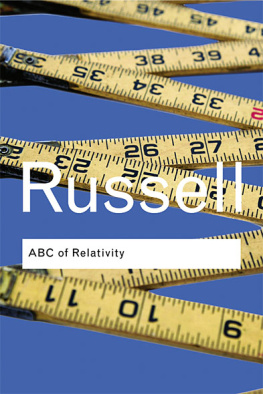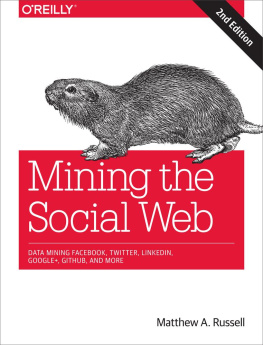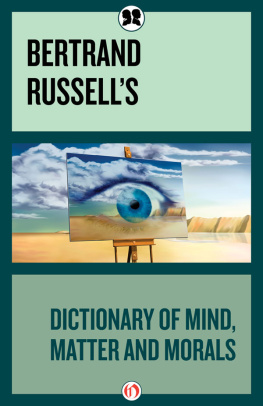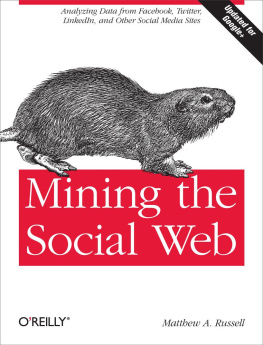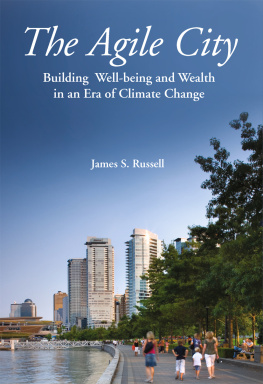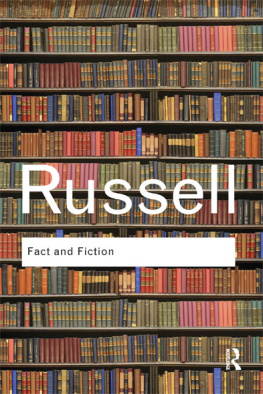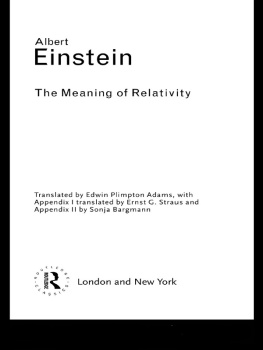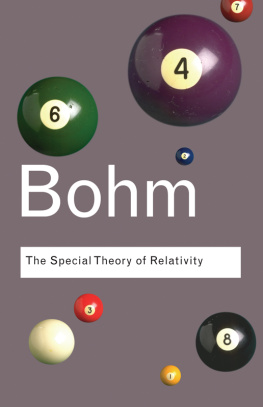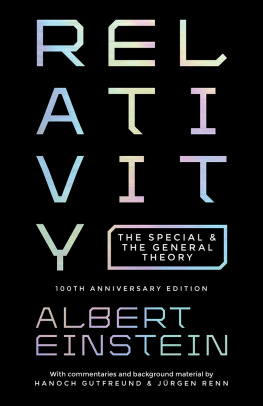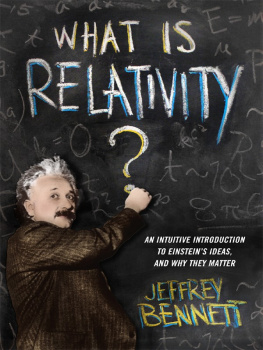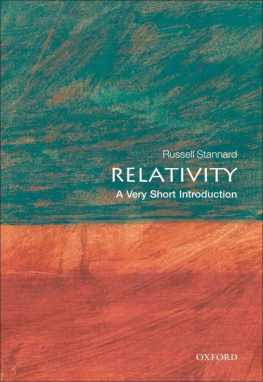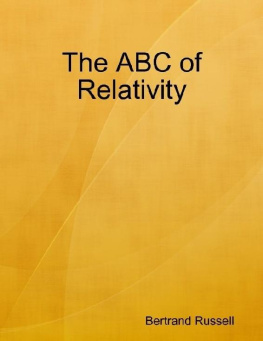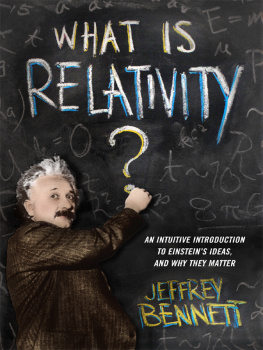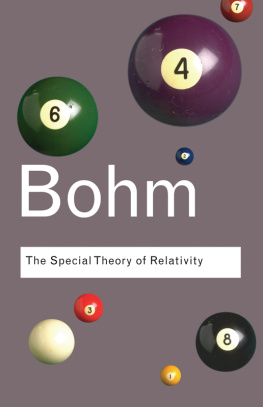Russell - ABC of Relativity
Here you can read online Russell - ABC of Relativity full text of the book (entire story) in english for free. Download pdf and epub, get meaning, cover and reviews about this ebook. year: 2009, publisher: Taylor & Francis, genre: Romance novel. Description of the work, (preface) as well as reviews are available. Best literature library LitArk.com created for fans of good reading and offers a wide selection of genres:
Romance novel
Science fiction
Adventure
Detective
Science
History
Home and family
Prose
Art
Politics
Computer
Non-fiction
Religion
Business
Children
Humor
Choose a favorite category and find really read worthwhile books. Enjoy immersion in the world of imagination, feel the emotions of the characters or learn something new for yourself, make an fascinating discovery.
- Book:ABC of Relativity
- Author:
- Publisher:Taylor & Francis
- Genre:
- Year:2009
- Rating:5 / 5
- Favourites:Add to favourites
- Your mark:
- 100
- 1
- 2
- 3
- 4
- 5
ABC of Relativity: summary, description and annotation
We offer to read an annotation, description, summary or preface (depends on what the author of the book "ABC of Relativity" wrote himself). If you haven't found the necessary information about the book — write in the comments, we will try to find it.
ABC of Relativity — read online for free the complete book (whole text) full work
Below is the text of the book, divided by pages. System saving the place of the last page read, allows you to conveniently read the book "ABC of Relativity" online for free, without having to search again every time where you left off. Put a bookmark, and you can go to the page where you finished reading at any time.
Font size:
Interval:
Bookmark:
ABC of Relativity
It affords an ideal introduction to the theories of special and general relativity.
Nature
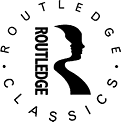
Routledge Classics contains the very best of Routledge publishing over the past century or so, books that have, by popular consent, become established as classics in their field. Drawing on a fantastic heritage of innovative writing published by Routledge and its associated imprints, this series makes available in attractive, affordable form some of the most important works of modern times.
For a complete list of titles visit
www.routledge.com/classics
Bertrand Russell
With an introduction by Peter Clark

London and New York
This edition first published in 1925
by George Allen & Unwin Ltd, London
First published in Routledge Classics 2009
by Routledge
2 Park Square, Milton Park, Abingdon, Oxon OX14 4RN
Simultaneously published in the USA and Canada
by Routledge
270 Madison Ave, New York, NY 10016
Routledge is an imprint of the Taylor & Francis Group, an informa business
This edition published in the Taylor & Francis e-Library, 2008.
To purchase your own copy of this or any of Taylor & Francis or Routledges collection of thousands of eBooks please go to www.eBookstore.tandf.co.uk.
2009 The Bertrand Russell Peace Foundation Ltd
Introduction 1997 Peter Clark
All rights reserved. No part of this book may be reprinted or reproduced or utilised in any form or by any electronic, mechanical, or other means, now known or hereafter invented, including photocopying and recording, or in any information storage or retrieval system, without permission in writing from the publishers.
British Library Cataloguing in Publication Data
A catalogue record for this book is available from the British Library
Library of Congress Cataloging-in-Publication Data
A catalog record for this book has been requested
Russell, Bertrand, 18721970.
[A B C of relativity]
ABC of relativity / Bertrand Russell.
p. cm.(Routledge classics)
Originally published: A B C of relativity. London : George Allen & Unwin, 1925.
Includes index.
1. Relativity (Physics) I. Title. II. Title: A B C of relativity.
QC6.R8 2009
530.11dc22
2008049269
ISBN13: 978-1-134-02684-5 ePub ISBN
ISBN10: 0-415-47382-9 (pbk)
ISBN10: 0-203-87547-8 (ebk)
ISBN13: 978-0-415-47382-8 (pbk)
ISBN13: 978-0-203-87547-6 (ebk)
This book first appeared in 1925. The basic principles of relativity have not changed since then, but both the theory and its applications have been much extended, and some revision was necessary for the second and subsequent editions. For the second and third editions I carried out these revisions with Bertrand Russells approval. The most substantial revision was a rewriting of to incorporate the expansion of the Universe, established in the late 1920s.
Russell died in 1970. Further revisions in 1985 for the fourth edition, of which the present edition is an unaltered reprint, were entirely my responsibility. I again altered a number of passages to agree with present knowledge, and did my best to renounce the convention that the masculine includes the feminine, acceptable, or at least tolerated, sixty years earlier, but now no longer so. I felt that Russell, who was a pro-feminist ahead of his time, would have approved of this renunciation. I did not presume to meddle with the substance of the last two chapters, which are largely philosophical, rather than physical, in character.
Felix Pirani, 2002
It is surely an outstanding tribute to Russells extraordinary expository and literary powers that a non-mathematical introduction written over seventy years ago to a major and at that time quite revolutionary physical theory should still provide an accurate guide to that theory. It is also a rather sobering reflection that this excellent book contrasts so clearly in style and presentation with the breathless and sensational writing which so often characterises attempts to popularise science today. Any reader of Russells book, ignoramus or cognoscenti, will be delighted by the good humour, the pellucid and witty prose style of the work and will gain a thorough understanding of the basic physical principles at the heart of relativity theory. As a non-mathematical introduction it is just as valuable now as it was when it was first published in 1925.
Russell remarks in his autobiography (The Autobiography of Bertrand Russell, Volume II, 19141944, London: Allen & Unwin, 1968, p. 152), that he wrote it, its sister volume The ABC of Atoms (London: Kegan Paul, 1923) and What I Believe (London: Kegan Paul, 1925) in order to earn money. Whereas the second of these volumes has been overtaken by the developments in quantum physics in particular the elaboration of the New Quantum theory after 1925 the former exposition has very much withstood the test of time, despite the very considerable advances in relativity and cosmology.
Russell had returned from China in September of 1921 and had no academic appointment. He reports that he did relatively well with his ABC books but remained rather poor until the publication of a book on education in 1926, after which he prospered financially. It is worth nothing what a phenomenal output of writing he managed in the decade from 1920. This included three important contributions to logic and philosophy, a new edition of Principia Mathematica in 1925 and two major works, The Analysis of Mind (London: Allen & Unwin, 1921) and The Analysis of Matter (London: Kegan Paul, Trench, Trubner & Co., 1927). Part of this latter volume formed the Tarner Lectures given in Trinity College Cambridge in 1926. The lectures were devoted to the epistemology of the new physics and contained an elegant, logical and structural analysis of relativity theory and its relation to pure and applied geometry and two lectures on the foundations of the quantum theory as then understood. On top of all this were books on such diverse subjects as China, happiness, marriage and the future of society and science.
This was clearly a period in which Russells thought was dominated by social themes and the need to spread and popularise knowledge in a way which would overcome what he saw as deep-seated irrationality, born of ignorance and lack of educational opportunity, which had manifested itself in the alacrity with which the populations of Europe had partaken in the rise of nationalism and the First World War. It was certainly a heroic period in Russells life, when he earnestly believed that the sort of blind unthinking prejudice which he conceived to be fundamentally responsible for the horrors of the First World War could be transcended by the dissemination of knowledge and the exercise of critical reasoning power by all classes of society. His huge output of this period was designed to bring within, as far as possible, everyones grasp the freedom of thought and action which knowledge and learning brings. That spirit of enlightenment certainly pervades the ABC of Relativity.
There is no doubt at all that Russells book is an expository masterpiece. There are two aspects of it, however, which might mislead the unwary reader. The first concerns what Special Relativity is fundamentally about what its domain of discourse is and the second concerns the transition from the Special to the General Theory. Throughout his discussion of the Special Theory Russell refers to the observer and treats the difference between the classical Newtonian framework and Special Theory as showing that the key relations of simultaneity, length, time and temporal order, which are treated as absolutes in the classical framework, are in the Special Theory dependent on the observer.
Font size:
Interval:
Bookmark:
Similar books «ABC of Relativity»
Look at similar books to ABC of Relativity. We have selected literature similar in name and meaning in the hope of providing readers with more options to find new, interesting, not yet read works.
Discussion, reviews of the book ABC of Relativity and just readers' own opinions. Leave your comments, write what you think about the work, its meaning or the main characters. Specify what exactly you liked and what you didn't like, and why you think so.

